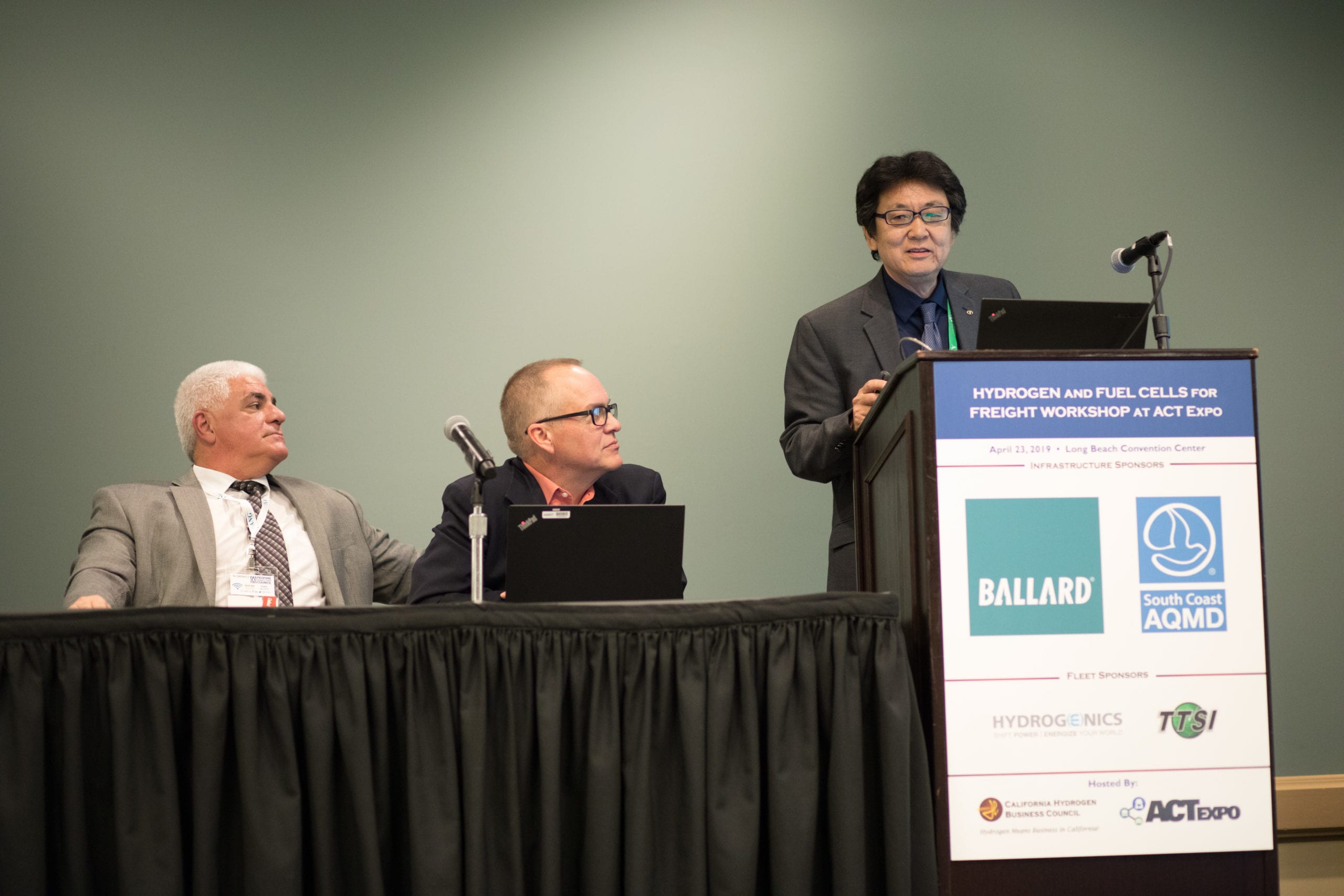The California Hydrogen Business Council (CHBC), the leading advocate for the hydrogen and fuel cell industry in California, recently hosted two workshops focusing on the successful implementation of hydrogen vehicles across both the freight and port sectors.
The first event was the Hydrogen and Fuel Cells for Freight Workshop at the Advanced Clean Transportation (ACT) Expo at the Long Beach Convention Center in April. The workshop gave fleet operators an inside look into the zero emission solution that hydrogen and fuel cell vehicles provide. With over 170 people in attendance, the event was packed with presentations from community leaders, universities, fuel cell technology companies, hydrogen providers, and truck OEMs. One of the most valuable sessions for attendees proved to be a one-on-one interview with a fleet operator, Tony Williamson, director of compliance and sustainability at TTSI, who detailed his experience using hydrogen fuel cell Class 8 trucks in normal drayage operations. The audience walked away with a better understanding of the current state of hydrogen and fuel cell technology as well as the vision of a zero emission, hydrogen-fueled, heavy-duty transportation future. Representatives from Toyota, Hyundai, Nikola Motor Company, Air Liquide, and NEL Hydrogen each gave presentations to the workshop audience.
Emission Reduction Benefits and More
It is clear from the interest, attention, and support of educational events such as the CHBC’s workshops, that anticipated mandates on heavy-duty vehicles, such as the California Air Resources Board’s Advanced Clean Truck Regulations, will have long lasting impacts for the hydrogen fuel cell sector. To meet these emission targets, an increasing number of fleets will turn to fuel cell electric trucks (FCETs) as these vehicles offer the ability to operate continuously, refuel in minutes, and haul heavy payloads, while producing zero emissions.
It is clear from the interest, attention, and support of educational events that anticipated mandates on heavy-duty vehicles will have long lasting impacts for the hydrogen fuel cell sector.
The total cost of ownership has been another point of interest recently covered at events and discussed in workshops. Again at ACT Expo, a separate session compared technology platforms and detailed the success of Plug Power’s hydrogen fuel cell forklifts. In Plug Power’s example, for instance, the capital cost for outfitting a warehouse with 200-300 hydrogen fuel cell vehicles was less than the fast charging, electric equivalent.
Addressing the Challenges Ahead
The current hurdle for widespread adoption of fuel cell heavy-duty trucks is the lack of hydrogen infrastructure, specifically infrastructure intended for use by larger vehicles. This is what the California Air Resources Board ZANEFF (Zero-Emission and Near Zero-Emission Freight Facilities) project has been able to tackle by funding ten Toyota/Kenworth Class 8 fuel cell trucks. These vehicles will be refueled at two hydrogen stations, built by Shell, intended for heavy-duty Class 8 refueling located in Wilmington and Ontario, California. With a larger footprint, these stations are specifically built to accommodate heavy-duty, Class 8 trucks which require more space to maneuver while fueling.
The California Hydrogen Business Council (CHBC) and Canadian Hydrogen and Fuel Cell Association (CHFCA) also recently held a Ports Workshop as part of the f-cell Impulse Summit in Vancouver, Canada. This was the first workshop held by the CHBC in Canada and focused on the convening of stakeholders around the ports of Seattle, Tacoma and Vancouver, Canada. The CHBC drew upon experience from previous workshops held in the ports of Los Angeles and Long Beach since 2016. The event brought technology providers, port authorities, and end users together to discuss the advantages and challenges of implementing and operating hydrogen fuel cell vehicles. About 50 attendees participated in the workshop, providing lively discussion across topics. The event included speakers from both sides of the US/Canada border, with panels focusing on the potential for hydrogen in various port applications, including vessels, and the importance of ports around the world to transition to more sustainable operations.
A key element of the workshop was a panel that included representatives from the local trucking industry and nearby port authority. These two organizations are relatively new to hydrogen and were looking to expand their knowledge on its capabilities as well as its constraints. The workshop attendees provided positive feedback that the event helped to push forward discussions around the use of hydrogen and fuel cells in the Vancouver and Seattle/Tacoma area.
More Workshops and Events on the Horizon
Workshops and events such as these allow the CHBC to continue its education and outreach work covering hydrogen fuel cells. As with all CHBC’s workshops, a report will be drafted containing notable discussions and outcomes of each workshop. The workshop reports will be presented in an upcoming webinar this summer, hosted by ACT News. Later this year, the CHBC will hold a workshop focused on how hydrogen fuel cell buses can help the state meet the new Innovative Clean Transit (ICT) requirement. This mandate requires 100% of California’s transit bus purchases to be zero emission by 2029, in order for the state to reach a goal for all public transit agencies to transition to 100% zero emission bus fleets by 2040. The workshop will be held as part of the California Trucking Association’s annual conference in November.


